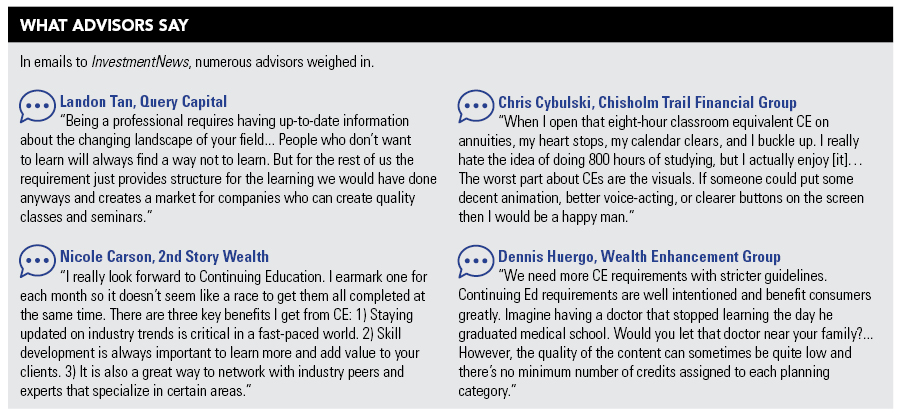

There has been an unusually high number of disciplinary actions filed by Finra this year over a curious kind of advisor misconduct: Cheating to get continuing education credits.
It’s not the first time the self-regulatory organization has had CE cheating reported to it, but the nearly two dozen cases so far in 2024 suggest that more brokers are taking shortcuts – or at least that they’re more frequently getting caught.
Some of the actions appear to be isolated incidents, though some firms had multiple brokers who agreed to fines and suspensions. The most notable was Northwestern Mutual, where numerous people had others complete 15 hours of CE for renewing their licenses in New York in 2022. Finra fined brokers $5,000 and suspended them for a month, though the orders did not require the brokers to admit or deny the findings.
People who have been in the industry for years said that they were aware of CE cheating in the past at large brokerages, where one employee, such as an administrative assistant, might sit through online programs on behalf of numerous others.
In Northwestern’s case, the firm reported misrepresentations by some employees on their CE to Finra.
“Northwestern Mutual takes matters of governance and compliance seriously, including our responsibility to regulatory bodies and our commitment to meeting continuing education requirements. Upon become aware of certain information, we took immediate steps to self-report to the appropriate regulatory bodies and began a thorough investigation regarding continuing education practices,” a company spokesperson said in a statement. “It is our expectation that all financial representatives and their teams individually meet the continuing education requirements necessary to keep their licenses and registrations current. This also includes following all company policies and individual requirements of each testing authority when completing ongoing education obligations. We look forward to bringing this matter to closure.”

What’s so bad about CE?
Continuing education is a fact of life for many professions requiring licenses, including the securities, insurance, and financial planning worlds. Every advisor who spoke with InvestmentNews acknowledged the importance of staying current on industry practices and regulations.
Some said they enjoy CE. Others said that much of it is a check-the-box exercise that birthed a cottage industry of education providers whose content is lacking in substance.
And having more than one license and designation can compound the challenges of staying current on credits. Finding CE that overlaps with more than one designation can also be difficult.
Jenny Logan, owner of Chisholm Financial Planning and Investments, has her work cut out for her. In addition to being a CFP, she’s a lawyer, the latter of which requires about 50 hours of CE every two years in California, she said. She also used to have an insurance license, and adds that beyond state CE requirements, broker-dealers have their own.
“Every one of us in this industry has some designation that is just overwhelming,” she said.
Independent of CE requirements, she spends about 10 to 15 percent of her work week on education, she said. But the work to stay current for designations and licenses has become more of a chore than a helpful experience, in part because materials often cover short-term trends rather than long-term strategies to help make advisors better at their jobs, she said.
“The quality of them is just not ideal,” she said.
Philip Petrowski, senior partner at Blackhorn Partners, used to have six designations. The complexity and costs of maintaining those made him cut back to just two in 2022, he said.
Prospects almost never ask about designations, such as whether he’s a Certified Financial Planner, he said. And the value for an advisor of having more than 60 CE credit hours a year didn’t add up, he said.
“It’s too confusing to the consumer. And for the advisor, it’s too difficult to keep up with the different deadlines,” he said. “There’s got to be a better way.”
Even with fewer designations and less than half the CE hours he had before, he isn’t a fan of most organizations that provide CE for financial advisors.
“It’s become a cash grab,” he said.
While some CE providers offer credits without much useful education, he would prefer to see quality material that would help make him more informed, he said.
“The industry changes so fast,” he said. “It’s super important to put the focus on quality CE.”
He favored courses on Kitces.com, which provided more than “a check-the-box and turn-it-in” experience, he said.
Emphasis on education
A fundamental challenge to regulation that requires CE is that it creates a “forced market,” said Michael Kitces, head of planning strategy at Buckingham Strategic Partners and cofounder of the XY Planning Network.
“Companies that manufacture or distribute products try to offer CE credits to advisors that really are just a veiled sales pitch,” Kitces said.
Some asset managers, like Vanguard, partner with credible CE providers, making their content more legitimate, he said. Others make content based on their own wholesalers, which introduces a conflict of interest, he said.
And there are outside options from CE providers have give basic, unchallenging materials, he said.
“There are a lot of CE programs out there where if you already have some industry knowledge and experience, you can pass the quiz without reading the article or viewing the webinar.”
His company, Kitces.com, goes the other way, he said.
“We try to work with the advisors who don’t just want to check a box – they want to learn.”
That makes the material more difficult, he said. A common request made by new members to his service team is to reset quizzes, as they were not initially expecting much of a challenge, he said.
At 15 CE hours per year required for the profession, CFPs have less of a burden than others, like CPAs, which can have more than double that, he noted. However, added designations make things harder.
“As advisors do pursue education, which includes professional designations… we are living in a world where you need multiple types,” he said. “The pressures around finding multiple program, multi-designation CE is increasingly becoming a pain point for advisors who leaded into education.”

Summit Financial unveiled a suite of eight new tools, including AI lead gen and digital marketing software, while MassMutual forges a new partnership with Orion.

A new analysis shows the number of actions plummeting over a six-month period, potentially due to changing priorities and staffing reductions at the agency.

The strategic merger of equals with the $27 billion RIA firm in Los Angeles marks what could be the largest unification of the summer 2025 M&A season.

Report highlights lack of options for those faced with emergency expenses.

However, Raymond James has had success recruiting Commonwealth advisors.
Orion's Tom Wilson on delivering coordinated, high-touch service in a world where returns alone no longer set you apart.
Barely a decade old, registered index-linked annuities have quickly surged in popularity, thanks to their unique blend of protection and growth potential—an appealing option for investors looking to chart a steadier course through today's choppy market waters, says Myles Lambert, Brighthouse Financial.
